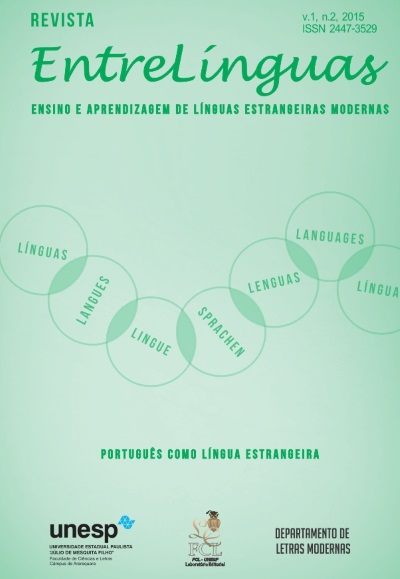El portugués me hace feliz: emoções compartilhadas em práticas humanizadoras de ensino e aprendizagem de português língua estrangeira em um contexto mediado pelo computador
DOI:
https://doi.org/10.29051/el.v1i2.8063Palavras-chave:
Ensino/aprendizagem de português língua estrangeira, Emoções, Abordagem humanizadora, Contexto multilíngue e multicultural, Formação do professor de línguas,Resumo
Qual a relação entre aprender uma língua e sentir-se feliz? Que contextos e ações podem promover uma aprendizagem de línguas mais humanizadora? Tendo por pressuposto o “aprender línguas positivamente” (GOMES DE MATOS, 1996, 2010, 2014), este trabalho tem por objetivo caracterizar um contexto virtual multilíngue e multicultural (DE OLIVEIRA, 2014), que possibilita práticas humanizadoras de ensino/ aprendizagem de português língua estrangeira (PLE). Nesse contexto, uma interagente mexicana manifesta suas emoções e sentimentos positivos sobre aprender PLE com uma interagente brasileira. Ela também reflete sobre suas experiências anteriores e menos humanizadoras de aprendizagem dessa língua e sobre o papel do professor na promoção do bem-estar na aprendizagem. Os resultados sugerem que as emoções devem ser consideradas no estabelecimento de uma aprendizagem de pertencimento e de identificação em um contexto multilíngue e multicultural (MURPHEY; PROBER; GONZALES, 2010; BARCELOS, 2010; COELHO, 2010; PELLIM, 2010; DE OLIVEIRA, 2014) e que o teor humanizador das interações favorece o sucesso do processo de ensino/aprendizagem e de reflexão do professor de línguas nesse contexto.
Downloads
Downloads
Publicado
Como Citar
Edição
Seção
Licença
Os manuscritos aceitos e publicados são de propriedade da Revista EntreLínguas. Os artigos publicados e as referências citadas na Revista EntreLínguas são de inteira responsabilidade de seus autores.
Transferência de direitos autorais – autorização para publicação
Caso o artigo submetido seja aprovado para publicação, já fica acordado que o(s) autor(es) autoriza(m) a UNESP a reproduzi-lo e publicá-lo na EntreLínguas, entendendo-se os termos “reprodução” e “publicação” conforme definição respectivamente dos incisos VI e I do artigo 5° da Lei 9610/98. O artigo poderá ser acessado pela rede mundial de computadores (Internet), sendo permitidas, a título gratuito, a consulta e a reprodução de exemplar do artigo para uso próprio de quem a consulta, desde que haja a citação ao texto consultado. Essa autorização de publicação 328 EntreLínguas, Araraquara, v. 1, n .2, p. 323-328, jul./dez. 2015 não tem limitação de tempo, ficando a UNESP responsável pela manutenção da identificação do(s) autor(es) do artigo. Os artigos publicados e as referências citadas na Revista EntreLínguas são de inteira responsabilidade de seus autores.











